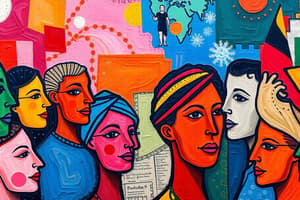Podcast
Questions and Answers
What factors contributed to the increase of multiculturalism in Britain after the Second World War?
What factors contributed to the increase of multiculturalism in Britain after the Second World War?
Immigration from Commonwealth countries due to the UK's booming economy in the late 1950s and 1960s.
Which regions of the UK saw an influx of immigrants during this time?
Which regions of the UK saw an influx of immigrants during this time?
The North of England and the Midlands.
What changes occurred in the population of Britain after the Second World War?
What changes occurred in the population of Britain after the Second World War?
The population changed from being overwhelmingly white, ethnically British and Christian to being constituted by creeds, cultures, and communities drawn from all over the globe.
What laws were passed in the 60s and 70s to prevent racial discrimination and racist hate crimes?
What laws were passed in the 60s and 70s to prevent racial discrimination and racist hate crimes?
What is an example of cultural integration in British society?
What is an example of cultural integration in British society?
What is currently considered Britain's number one national dish?
What is currently considered Britain's number one national dish?
What percentage of top British cultural figures come from migrant or minority ethnic backgrounds?
What percentage of top British cultural figures come from migrant or minority ethnic backgrounds?
What impact did cultural integration have on business and sport in Britain?
What impact did cultural integration have on business and sport in Britain?
What is the significance of Notting Hill carnival in British society?
What is the significance of Notting Hill carnival in British society?
What is the current status of racial equality in Britain?
What is the current status of racial equality in Britain?
What is the significance of chicken tikka masala in British cuisine?
What is the significance of chicken tikka masala in British cuisine?
What were the primary countries of origin for migrants who came to work in the UK in the late 1950s and 1960s?
What were the primary countries of origin for migrants who came to work in the UK in the late 1950s and 1960s?
What was the religious makeup of Britain's population before the Second World War?
What was the religious makeup of Britain's population before the Second World War?
What is the main reason for the increase in multiculturalism in Britain after the Second World War?
What is the main reason for the increase in multiculturalism in Britain after the Second World War?
In which regions of the UK did migrants predominantly settle in the late 1950s and 1960s?
In which regions of the UK did migrants predominantly settle in the late 1950s and 1960s?
What did the UK economy experience in the late 1950s and 1960s that contributed to an increase in immigration?
What did the UK economy experience in the late 1950s and 1960s that contributed to an increase in immigration?
Flashcards are hidden until you start studying
Study Notes
Increase of Multiculturalism in Britain
- After World War II, Britain experienced an increase in multiculturalism due to labor shortages and the need for economic growth.
Regions of Immigration
- The UK regions that saw an influx of immigrants during this time were cities such as London, Birmingham, and Manchester.
Population Changes
- The population of Britain changed significantly after World War II, with an increase in migrants from former colonies, particularly from the Caribbean, India, and Pakistan.
Anti-Discrimination Laws
- Laws passed in the 1960s and 1970s aimed to prevent racial discrimination and racist hate crimes, including the Race Relations Act of 1965 and 1976.
Cultural Integration
- An example of cultural integration in British society is the adoption of Caribbean Carnival celebrations, such as the Notting Hill Carnival.
National Cuisine
- Chicken tikka masala is currently considered Britain's national dish, reflecting the cultural exchange and integration of Indian cuisine into British culture.
Cultural Figures
- Around 14% of top British cultural figures come from migrant or minority ethnic backgrounds, indicating a significant representation of diverse cultural influences.
Business and Sport
- Cultural integration had a positive impact on business and sport in Britain, with increased diversity leading to innovative ideas and improved performance.
Significance of Notting Hill Carnival
- The Notting Hill Carnival, a celebration of Caribbean culture, has become an important symbol of cultural integration and diversity in British society.
Racial Equality
- While significant progress has been made, racial equality remains an ongoing challenge in Britain, with ongoing efforts to address discrimination and promote inclusivity.
Chicken Tikka Masala
- Chicken tikka masala, a popular British dish, symbolizes the cultural fusion of Indian and British cuisine, reflecting the impact of multiculturalism on British food culture.
Primary Countries of Origin
- The primary countries of origin for migrants who came to work in the UK in the late 1950s and 1960s were India, Pakistan, and the Caribbean.
Religious Makeup of Britain
- Before World War II, Britain's population was predominantly Christian, with a small Jewish population, and a negligible number of Muslims and Hindus.
Main Reason for Multiculturalism
- The main reason for the increase in multiculturalism in Britain after World War II was the need for economic growth and labor shortages.
Settlement Patterns
- Migrants predominantly settled in urban areas, such as London, Birmingham, and Manchester, in the late 1950s and 1960s.
UK Economy
- The UK economy experienced a period of growth and labor shortages in the late 1950s and 1960s, contributing to an increase in immigration.
Studying That Suits You
Use AI to generate personalized quizzes and flashcards to suit your learning preferences.




